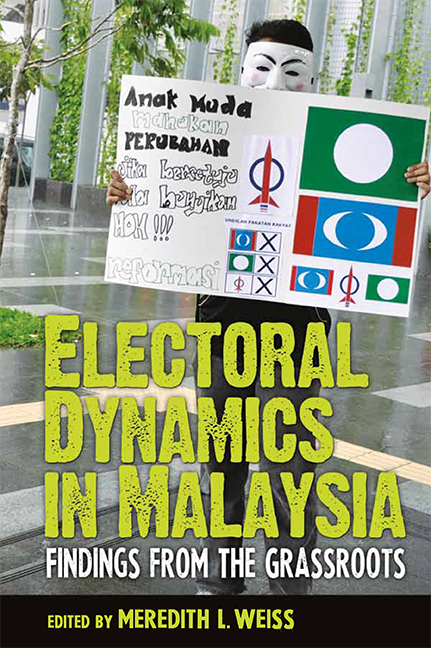Book contents
- Frontmatter
- Contents
- List of Tables
- Foreword
- Acknowledgements
- Glossary & Acronyms
- Chapter 1 Introduction: Patterns and Puzzles in Malaysian Electoral Dynamics
- Chapter 2 Arau, Perlis: The Irresistible Charm of Warlords, Women and Rewards?
- Chapter 3 Padang Serai, Kedah: Between the ‘Personal Touch’ and the Generous Hand
- Chapter 4 Kuala Nerus, Terengganu: New Malay Politics?
- Chapter 5 Balik Pulau, Penang: Home Run for the Home Boys
- Chapter 6 Lumut, Perak: Patronage, Clientelism and the Post-Coup Order
- Chapter 7 Kuantan, Pahang: Revealing the Ordinary
- Chapter 8 Pandan, Selangor: New Electoral Dynamics in Urban Malaysia
- Chapter 9 Kepong and Titiwangsa, Kuala Lumpur: Messages or Money?
- Chapter 10 Rembau, Negeri Sembilan: Personalities and Promises
- Chapter 11 Pulai, Johor: A Tale of Two Coalitions
- Chapter 12 Gelang Patah, Johor: Did Lim Kit Siang Truly Win His Last Gamble?
- Chapter 13 Kota Marudu and Keningau, Sabah: Personality, Patronage and Parochial Politics
- Chapter 14 Tuaran, Sabah: Party Loyalty and Rational Voting
- Chapter 15 Kota Kinabalu, Sabah: BN Loses Its ‘Fixed Deposit’
- Chapter 16 Beaufort, Sabah: Whither Lajim's Popularity?
- Chapter 17 Sibu and Lanang, Sarawak: Defeat of the Bosses
- Contributors
Chapter 5 - Balik Pulau, Penang: Home Run for the Home Boys
Published online by Cambridge University Press: 10 November 2017
- Frontmatter
- Contents
- List of Tables
- Foreword
- Acknowledgements
- Glossary & Acronyms
- Chapter 1 Introduction: Patterns and Puzzles in Malaysian Electoral Dynamics
- Chapter 2 Arau, Perlis: The Irresistible Charm of Warlords, Women and Rewards?
- Chapter 3 Padang Serai, Kedah: Between the ‘Personal Touch’ and the Generous Hand
- Chapter 4 Kuala Nerus, Terengganu: New Malay Politics?
- Chapter 5 Balik Pulau, Penang: Home Run for the Home Boys
- Chapter 6 Lumut, Perak: Patronage, Clientelism and the Post-Coup Order
- Chapter 7 Kuantan, Pahang: Revealing the Ordinary
- Chapter 8 Pandan, Selangor: New Electoral Dynamics in Urban Malaysia
- Chapter 9 Kepong and Titiwangsa, Kuala Lumpur: Messages or Money?
- Chapter 10 Rembau, Negeri Sembilan: Personalities and Promises
- Chapter 11 Pulai, Johor: A Tale of Two Coalitions
- Chapter 12 Gelang Patah, Johor: Did Lim Kit Siang Truly Win His Last Gamble?
- Chapter 13 Kota Marudu and Keningau, Sabah: Personality, Patronage and Parochial Politics
- Chapter 14 Tuaran, Sabah: Party Loyalty and Rational Voting
- Chapter 15 Kota Kinabalu, Sabah: BN Loses Its ‘Fixed Deposit’
- Chapter 16 Beaufort, Sabah: Whither Lajim's Popularity?
- Chapter 17 Sibu and Lanang, Sarawak: Defeat of the Bosses
- Contributors
Summary
Introduction
Balik Pulau is geographically the largest constituency in Penang, but has the fewest voters (49,641).The constituency encompasses the busy town of Bayan Lepas, the quiet township of Pulau Betong and the fishing villages in Teluk Bahang.
Balik Pulau voters are well known for their fierce loyalty to the United Malays National Organisation (UMNO). Even when the party got its hardest hit in the ‘political tsunami’ of the 2008 general election, UMNO candidates still managed to hold on to all the state seats in the constituency. The loss of the parliamentary seat for the first time, however, taught UMNO not to underestimate the voters in Balik Pulau. Hence, for the 13th general election in 2013, UMNO cautiously chose Balik Pulau ‘home boys’ and deployed its strongest grassroots machinery to regain its loss of five years ago.
The case of Balik Pulau demonstrates how essential candidates' identity is to the rural voters in Penang, coupled with effective campaign strategies. The analysis shows how Parti Keadilan Rakyat (PKR) simply fell short in winning the voters' hearts, despite having, the candidates claimed, served them tirelessly for the past five years. Its lack of suitable local candidates and the weakness of its campaign strategies caused PKR to lose the constituency to UMNO. Nonetheless, UMNO's narrow win in this election indicates clearly that the party no longer commands the strong popular support it enjoyed for decades. This slip in support suggests that however important the candidate and strategy, voters' preferences in Balik Pulau may gradually be changing with the emergence of a young, new generation who are exposed to a greater variety of information sources.
Progress of the campaign
The parliamentary seat
It is interesting to note that the candidates of both parties held similar perceptions of the voters in Balik Pulau. UMNO's Hilmi Yahaya, for instance, believed that, ‘if you are local candidate, it will be easier’. A PKR campaign worker in Teluk Bahang concurred with Hilmi's perception: 'in rural area, they are more interested with the candidate, whether he is an outsider or a local.
- Type
- Chapter
- Information
- Electoral Dynamics in MalaysiaFindings from the Grassroots, pp. 65 - 80Publisher: ISEAS–Yusof Ishak InstitutePrint publication year: 2013

